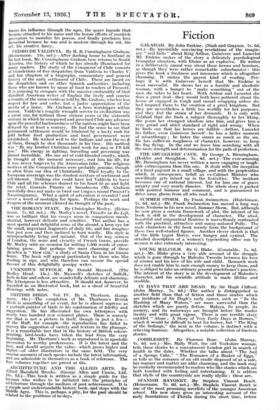Fiction
GALAHAD. By John Erskine. (Nash and Grayson. 7s. 6d. net.)—By irresistibly convincing revelations , of the imagin- ary " real facts " about King Arthur, Guinivere and Lancelot Mr. Erskine makes of the story a delicately psychological triangular situation, with Elaine as an explosive. He writes in a deliberately casual way about these heroes and heroines, as though they Were rather remarkable suburbanited : this gives the book a freshness and innocence which is altogether charming. It makes the gayest kind of reading. Per- haps it is with Guinivere herself that Mr. Erskine is most successful. He shows her as a forcible and idealistic woman, with a hunger to " make something " out of the men she takes to her heart. With Arthur and Lancelot she does a great deal—they would both have. pottered about the, house or engaged in rough and casual scrapping unless she had inspired them to the creation of a great kingdom. But they arc' nevertheless a little too worldly for her purposes, and they feel the strain of her demands. It is only with Galahad that she finds a subject thoroughly to her liking. She pours her strongest idealism into him, and gives him a very grand and strict standard of right and wrong. When he finds out that his heroes are fallible—Arthur, Lancelot his father, even Guinivere herself—he has a .bitter moment of misanthropy ; he hates the sinner as much as the sin. He has sufficient roughness of character, however, to keep his flag flying. In the end we leave him searching with all the more strength and determination for the path of perfection.














































 Previous page
Previous page